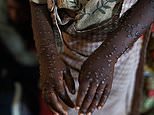Health
New Deadly Strain of Mpox Virus Emerges in California

A new strain of the Mpox virus, identified as Clade I, has been discovered in California, raising concerns about its severity and transmission. Two residents of Los Angeles County tested positive for this strain, which has a fatality rate of up to 10%. Health officials confirmed that both individuals contracted the virus locally, marking the first instance of Clade I being acquired within the United States.
The first case was reported on October 17, 2025, involving a resident from Long Beach, with the second case following shortly thereafter. Both patients were hospitalized but are now recovering at home, according to the Los Angeles County Department of Public Health. Details regarding the patients’ identities have not been disclosed.
Understanding Clade I and Its Implications
Clade I is considered more severe than the currently circulating Clade II, which has a mortality rate of less than 3% and has resulted in the deaths of 63 individuals in the U.S. since the 2022 outbreak. The new strain is noted for its increased transmissibility, which includes spread through close personal contact such as hugging, massages, and sexual intercourse.
The Centers for Disease Control and Prevention (CDC) reported that there have been six previous cases of Clade I in the U.S., all of which involved individuals who had traveled to regions in Central and East Africa, including a case in California in November 2024. Health officials emphasized that these cases were not connected.
Mayor Rex Richardson of Long Beach remarked, “While the overall risk of exposure to the public remains low, we are taking this very seriously. This underscores the importance of continued surveillance, early response, and vaccination.”
Transmission and Symptoms of Mpox
Mpox, formerly known as monkeypox, spreads through intimate contact. According to the Los Angeles County Department of Public Health, the virus can be transmitted through bodily fluids, sores, shared bedding, and even through coughing or sneezing. Symptoms of the disease include unusual rashes or sores resembling pimples or pus-filled blisters on the face, body, and genitals, along with fever, chills, headache, and swollen lymph nodes.
In areas where Mpox outbreaks have been prevalent, such as the Democratic Republic of the Congo (DRC), transmission has often occurred through contact with infected animals and crowded living conditions. Most patients typically recover without severe complications, though antiviral treatments may be considered for those at higher risk.
The Long Beach Department of Health and Human Services has advised the public to avoid intimate contact if experiencing any unexplained rashes or lesions. Those at risk, particularly gay and bisexual men, can access the JYNNEOS vaccine, which is administered in two doses to prevent infection.
Public health officials are closely monitoring the situation as they urge the community to remain vigilant and informed regarding Mpox.
-

 Health3 months ago
Health3 months agoNeurologist Warns Excessive Use of Supplements Can Harm Brain
-

 Health3 months ago
Health3 months agoFiona Phillips’ Husband Shares Heartfelt Update on Her Alzheimer’s Journey
-

 Science1 month ago
Science1 month agoBrian Cox Addresses Claims of Alien Probe in 3I/ATLAS Discovery
-

 Science1 month ago
Science1 month agoNASA Investigates Unusual Comet 3I/ATLAS; New Findings Emerge
-

 Science4 weeks ago
Science4 weeks agoScientists Examine 3I/ATLAS: Alien Artifact or Cosmic Oddity?
-

 Entertainment4 months ago
Entertainment4 months agoKerry Katona Discusses Future Baby Plans and Brian McFadden’s Wedding
-

 Science4 weeks ago
Science4 weeks agoNASA Investigates Speedy Object 3I/ATLAS, Sparking Speculation
-

 Entertainment4 months ago
Entertainment4 months agoEmmerdale Faces Tension as Dylan and April’s Lives Hang in the Balance
-

 World3 months ago
World3 months agoCole Palmer’s Cryptic Message to Kobbie Mainoo Following Loan Talks
-

 Science4 weeks ago
Science4 weeks agoNASA Scientists Explore Origins of 3I/ATLAS, a Fast-Moving Visitor
-

 Entertainment4 months ago
Entertainment4 months agoLove Island Star Toni Laite’s Mother Expresses Disappointment Over Coupling Decision
-

 Entertainment3 months ago
Entertainment3 months agoMajor Cast Changes at Coronation Street: Exits and Returns in 2025









